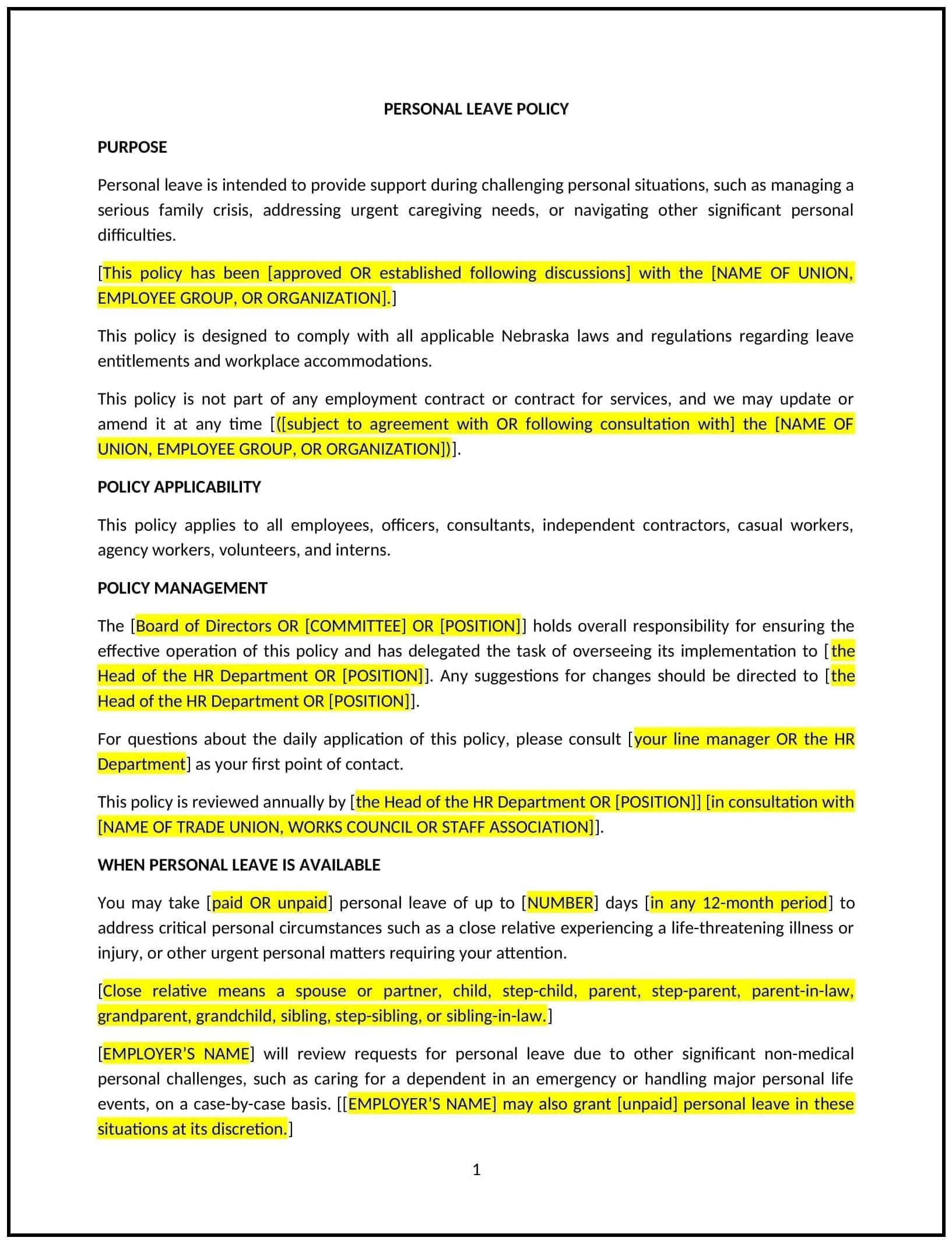Got contracts to review? While you're here for policies, let Cobrief make contract review effortless—start your free review now.

Customize this template for free
Personal leave policy (Nebraska)
A personal leave policy helps Nebraska businesses provide employees with time off for personal reasons that do not fall under other leave categories such as medical leave or vacation. This policy outlines the process for requesting personal leave, eligibility criteria, and whether the leave is paid or unpaid. It is designed to support employees in managing personal matters while maintaining workplace productivity and fairness.
By adopting this policy, businesses in Nebraska can provide flexibility for employees who need time off for personal reasons while ensuring that leave requests are handled consistently.
How to use this personal leave policy (Nebraska)
- Define eligibility for personal leave: Specify which employees are eligible for personal leave, including whether it applies to full-time, part-time, or temporary employees. Clarify any length-of-service requirements before employees can request leave.
- Establish leave request procedures: Employees should be required to submit a formal leave request, typically in writing, with as much notice as possible. The policy should specify how requests are submitted and to whom.
- Clarify paid versus unpaid leave: Specify whether personal leave is paid, unpaid, or deducted from other paid leave balances such as PTO or vacation days. If paid personal leave is offered, detail the conditions and limits.
- Set leave duration limits: Outline how much personal leave an employee can take per year, whether it must be taken in full-day increments, and any maximum consecutive days allowed.
- Address approval considerations: Explain the factors managers consider when approving or denying personal leave requests, such as workload, business needs, and fairness across the team.
- Maintain job protection guidelines: Indicate whether personal leave guarantees job protection or if reinstatement depends on business needs. If job protection is not provided, clarify any reemployment considerations.
- Establish return-to-work procedures: Require employees to notify their manager or HR department about their planned return date and any changes to their leave duration.
- Review and update: Periodically review and update the policy to ensure it aligns with Nebraska employment regulations and business needs.
Benefits of using this personal leave policy (Nebraska)
This policy provides several benefits for Nebraska businesses:
- Supports employee well-being: Allowing personal leave gives employees flexibility to handle personal matters, reducing stress and improving overall job satisfaction.
- Maintains workplace productivity: By setting clear procedures, businesses can manage leave requests effectively without disrupting operations.
- Promotes fairness and consistency: A well-defined policy ensures that all personal leave requests are handled fairly and consistently, preventing favoritism or misinterpretation.
- Helps retain employees: Providing personal leave options encourages employees to stay with the company rather than resigning when personal issues arise.
- Reduces absenteeism issues: A structured leave policy encourages employees to follow proper leave request procedures rather than taking unapproved absences.
Tips for using this personal leave policy (Nebraska)
- Communicate the policy clearly: Ensure all employees understand the process for requesting personal leave by including it in employee handbooks and discussing it during onboarding.
- Encourage early leave requests: Employees should be encouraged to submit leave requests as early as possible to allow managers to plan for coverage and minimize disruptions.
- Maintain confidentiality: Personal leave reasons should remain confidential unless the employee voluntarily shares details. HR and managers should handle leave requests with discretion.
- Be flexible when possible: While business needs should be prioritized, offering flexibility where feasible helps maintain employee morale and engagement.
- Monitor leave trends: Keep track of personal leave requests to identify patterns that may indicate workplace issues, such as burnout or work-life balance concerns.